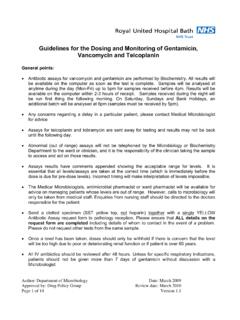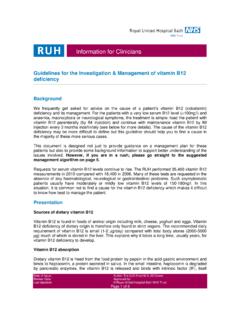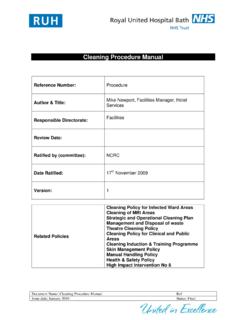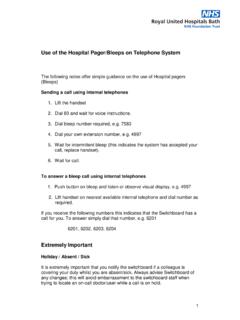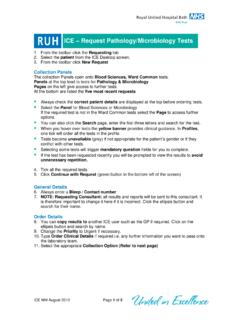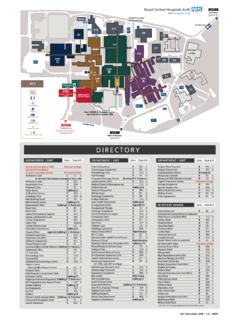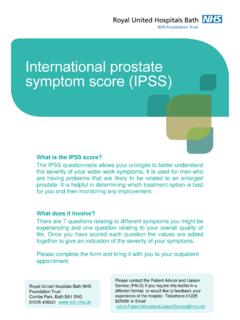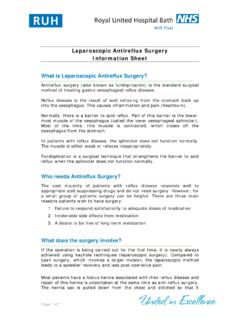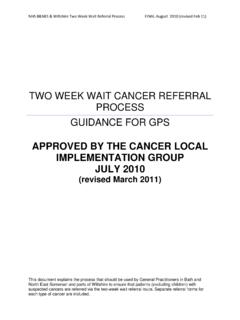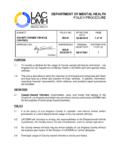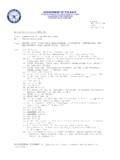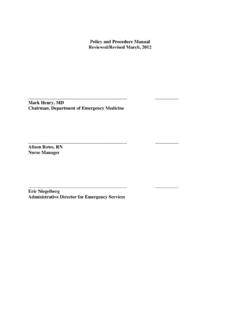Transcription of On Call Policy - Royal United Hospital
1 Document name: On call Policy Ref.: 136 Issue date : 03 August 2015 Status: Final (v4) Author: Sue Smith Deputy Director of HR page 1 of 16 On call Policy Reference Number: 136 Author & Title: Sue Smith Deputy Director of HR Responsible Director: Director of HR Review date : 09 July 2016 Ratified by: Strategic Workforce Committee date Ratified: 09 July 2015 Version: Final (v4) Related Policies and Guidelines Work Life Balance (170) Expenses (004) Supporting Attendance (117) (formerly Sickness Absence) Document name: On call Policy Ref.: 136 Issue date : 03 August 2015 Status: Final (v4) Author: Sue Smith Deputy Director of HR Page 2 of 16 Index: 1.
2 Policy Summary _____ 4 2. Definition of Terms Used _____ 4 3. Duties and Responsibilities _____ 4 Managers_____ 4 Employees _____ 5 4. Principles _____ 6 5. Departmental Arrangements _____ 6 6. Payment for On Call_____ 7 Availability payment _____ 7 Payment for work done _____ 7 Payment for work done by telephone _____ 8 Pensionable status of payments _____ 8 Sickness absence and on call _____ 8 Short notice payments _____ 9 7. Travel Time & Expenses _____ 9 Travel expenses, transport and parking _____ 9 8. Sleeping In _____ 9 9. Time Off In Lieu (TOIL) _____ 10 10. Working Time Regulations & Rest Periods _____ 10 Definition _____ 10 Rest periods _____ 10 Compensatory rest _____ 10 Records and monitoring _____ 11 11.
3 Transitional arrangements _____ 11 12. Claiming On call Payments _____ 12 13. Policy Review _____ 12 Appendix 1: Departmental On call Scheme _____ 13 Ratification Assurance Statement _____ 14 Consultation Schedule _____ 15 Equality Impact: (A) Assessment Screening _____ 16 Document name: On call Policy Ref.: 136 Issue date : 03 August 2015 Status: Final (v4) Author: Sue Smith Deputy Director of HR Page 3 of 16 Amendment History Issue Status date Reason for Change Authorised Final 23/01/14 New Policy Strategic Workforce Committee Final 18/09/14 Travel expenses & work done by telephone Strategic Workforce Committee Final 26/02/15 Clarification of calls received during initial 2 hour time period Strategic Workforce Committee Final 28/05/15 Clarification of travel time as hours worked.
4 Strategic Workforce Committee Document name: On call Policy Ref.: 136 Issue date : 03 August 2015 Status: Final (v4) Author: Sue Smith Deputy Director of HR Page 4 of 16 1. Policy Summary This Policy sets out (1) the arrangements for the remuneration of and (2) the terms and conditions that apply to all on- call undertaken by staff on AfC (Agenda for Change) contracts. This Policy replaces the national on- call rules in paras and is in line with the principles contained in Annex A3 in Section 2 of the AfC Terms and Conditions of Service Handbook and any previous local or Whitley arrangements. 2. Definition of Terms Used On- call - A member of staff is on- call when, as part of an established arrangement with the Trust, he/she is available outside his or her normal working hours to work as and when required.
5 This includes arrangements where a member of staff chooses to remain on Trust premises/accommodation in order to fulfil their on- call requirements, but it is not a Trust requirement for them to remain on-site. Emergency call - A member of staff may be called in for an emergency when not on an on- call rota, for a major incident Normal working hours are those which are regularly worked and/or fixed by the contract of employment. This does not include overtime. 3. Duties and Responsibilities Managers Managers must: Ensure that rotas for out-of-hours work meet the requirements of the service. Ensure that rotas for out-of-hours work are cost effective and kept within budget limits set by the department or Division.
6 Ensure that rotas for out-of-hours work abide by the Working Time (Amendment) Regulations 2003, in particular rest periods, compensatory rest (see section 6), and health assessments for night work. Ensure that departmental arrangements are agreed in writing, approved by the Strategic Workforce Committee and reviewed on an annual basis.. Regularly review the operation of on- call schemes against service requirements to ensure that the out-of-hours service is being delivered Document name: On call Policy Ref.: 136 Issue date : 03 August 2015 Status: Final (v4) Author: Sue Smith Deputy Director of HR Page 5 of 16 in the safest and most cost effective way ( no.)
7 Of call -outs, consider 24/7 working). In line with needs of the service, offer choices for staff who have family and other responsibilities in line with the Work-life Balance Policy . Give sufficient notice to staff of the dates and times that they are required to work on out-of-hours on call rotas. Minimum standard is 4 weeks notice. Ensure equal treatment of staff, applying pro-rata rules to part-time workers in line with the needs of the service. Ensure that the Trust Policy and process for the authorisation and payment of on- call is followed. Employees If the requirement to work on- call is specified in an employee s contract of employment or job description, the employee is contractually obliged to do on- call .
8 Staff contracted to be on- call out-of-hours must: Ensure that they are available at all times of the required on- call period, and that members of the Trust and switchboard are informed how to contact them whilst on- call . Ensure that they are fit to attend work, must not present themselves for duty in an unfit state ( through alcohol or drugs) and must remain in a fit state whilst on duty. Report any concerns about another employee s fitness to work, in confidence, to their immediate manager or to Human Resources, or refer to a more senior colleague on-site, Clinical Site Manager. Be aware of and follow the local standard operating procedures relating to on- call .
9 Be familiar with the local arrangements for reporting any unavailability. Staff must ensure their on- call period is covered and revised cover arrangements are communicated appropriately. Ensure any requests to come off an on- call rota for health reasons, for a temporary period or permanently is agreed with their line manager, taking Occupational Health advice as appropriate. Document name: On call Policy Ref.: 136 Issue date : 03 August 2015 Status: Final (v4) Author: Sue Smith Deputy Director of HR Page 6 of 16 4. Principles The guiding principles of this Policy are in line with the Agenda for Change principles for harmonised on- call arrangements contained in Annex 3 of AfC Terms and Conditions, namely: To be consistent with the principles of equal pay for work of equal value.
10 To provide a payment that reflects the availability for being called. To take account of the frequency of on- call availability. To specify payment for work done whilst on call . To provide staff with the option to take time off in lieu (TOIL) rather than payment for work done. To allow for compensatory rest under the European Working Time Directive (EWTD). To specify the arrangements for payment of travel time and expenses. To specify the arrangements for public holidays. Where necessary, to specify sleeping in arrangements. To specify whether payments are pensionable or non-pensionable. To specify transitional arrangements where appropriate.
